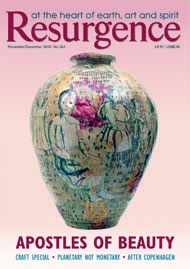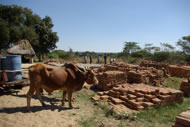In Tanzania, where there’s much less money and materialism, there’s much more compassion, social interaction and empathy. Put simply, we do things differently.
Empathy is the grease that oils all social life. In the absence of advanced capitalism, we miss out on a national health system, but we also completely avoid all the underlying social obsessions about lifestyle: whether to buy organic or not; this model of pram, or the other. This competitive acquisition of ‘stuff’ is completely absent, and consequently our social life is organised in a way that the Global North would do well to adopt. We cannot buy many things here – car spares or fine cotton sheets – but we are imaginative.
This morning, my 10-year-old friend Mossi was examining the labels of clothes at the huge second-hand market. “I am learning where the clothes are made,” she explained, rifling through a pile of jumpers from the UK, China, Hong Kong and Indonesia. This child knows what my undergraduate media students in the UK don’t – precisely where their clothes come from.
In a country where materialism is still nascent (socialism was abandoned officially in the late eighties, but many government departments kept the same staff, and privatisation and competition remain very young concepts), other structures exist to help people get ‘things’ – whether it’s a jar of pickle, a car or health care. It’s a complicated, informal system, based on favours and being amenable to helping others. It’s not necessarily based on money, and many Northern-based commentators make the mistake of clumping these social and economic systems together and calling it corruption. In doing so they fall into the trap of simplifying Africa into the totems: poverty, corruption, illness, war, tribalism.
In any case this reading ignores two central concepts. First, the majority of Africa is at peace, both internally and between neighbours. There are only two wars going on at present: in the Congo (a complicated war aided in part by the West’s participation in mining resources to keep our mobile phone markets afloat) and in Chad. Secondly, Tanzanian rates of suicide, juvenile delinquency, murder, rape, paedophilia, petty and serious crime and mental ill health are among the lowest; plus Tanzania scores high on the happiness index.
Tanzania, like Uganda, Botswana and South Africa, has a higher overall rate of economic growth and a higher GDP as well as a happier population than most European countries, just to strengthen the case! How is it possible too that Tanzania, where people live on such small incomes and make do with so little, is in many tangible ways an emotionally more functional place to live?
I am not arguing that Tanzanians are a ‘primitive but happy lot’. Nor am I advocating a return to the ‘simple but happy idyll of Indigenous ways’. But despite many real hurdles and challenges, the strategies that are embedded in Tanzanian society (like many other African societies) are far more resilient, sophisticated and diverse than the Global North ever gives us credit for.
For example, my friend Ibrahim, a taxi driver, regularly takes jars of pickle to the ferry port for his neighbour to sell on the mainland, and in return her husband services Ibrahim’s car. His neighbour is a friend, just as I am, but we both give something and get something in return. We talk a lot about money, and being rich, in this society where many wazungu (white people) have real trouble imagining what most Tanzanians live on, and even less idea of the thought required to make things last: brooms are bound with cycle inner tubes to strengthen the handles, soap is used down to the tiniest sliver, broken shards of mirror are kept to use for shaving, empty alcohol sachets are used to start fires. Ibrahim, after quoting Julius Caesar (on power) at me in the cab, remarked casually, “Well, in the end the richness is in your heart, not your hand. I mean it’s the friends you have, the relationships that matter, not the car, the plasma screen, the DVD...”
There are few safety nets here: in an accident recently, we flagged down the nearest car, and the occupants took us to hospital, which was a relief because there are no ambulances in this area. There was no question of the driver being ‘too busy’. The hospital, which had no furniture or equipment, was full of people: patients on the floor, a power cut, no beds and no clear sense of an emergency department or even any available doctors. Our lift stayed holding the dying man in his arms...together we tried to track down relatives for this stranger: it took five hours but at no point did anyone say they didn’t have time, or had something more important to do.
Of course there is real corruption. ‘How you get things done’ is not, however, as easily invidious, or categorical, as corruption: having a network of friends, people who can shortcut bureaucracy, also cancels out the monetary side of things, and means we rely a lot on goodwill, and trust. It’s not all sugar-coated loveliness. With typical humour we even have a name for it: wabenzi, meaning people who own Mercedes-Benz cars and are therefore obviously pocketing some spoils. But life is not all about money. It is impossible to be lonely, invisible, or unacknowledged in Tanzanian society, and this, I think, goes a long way towards creating social bonds that save people from actual, real problems.
There’s a variation of the same joke across Eastern and Southern Africa, about the length of time it takes for country people to greet each other as they ask about every single distant aged relative, the point being that by the time the greetings are over most of the elderly relatives in question have died! Living in a society where concern for others goes way beyond social pleasantries has real perks. Yes, it is still hard to imbue a sense of urgency sometimes, because people really do ‘have the time of day’ for each other. The plus side, though, is that there is a real sense of belonging and tolerance.
The desire to help each other is like social glue: during the period of President Nyerere in the 1960s and 1970s, egotism and individualism were actively discouraged and the slogan ujamaa (familyhood) encouraged. Empathy is not taught formally in schools, but selfishness is still checked in kids. I have never yet heard the Tanzanian equivalent of “Play nicely, Jacinta, and share!” Tanzanian kids just do share.
Language, of course, tells us a great deal about what societies value. The last time I walked to work, passers by greeted me with pole – sorry. What they meant was: “I am sorry you have to walk, I feel your pain!” This is significant because a concept that is culturally imbued in Tanzanians (and many other African cultures) is the idea of ubuntu. Roughly this means ‘I am, because you are’.
The word for ‘together’ is pamoja – literally, ‘as one’. There is no word in Swahili for ‘privacy’. Yet there is a distinct expression for doing something on your own: peke yako. This has no equivalent in English; it’s not ‘solitary’, it’s ‘being with yourself’.
And finally karibu – meaning ‘near’, ‘welcome’, ‘close’, or ‘don’t mention it’. This is the word I find myself frequently muttering when speaking English and wondering why there is no English translation and what that says about that culture.








